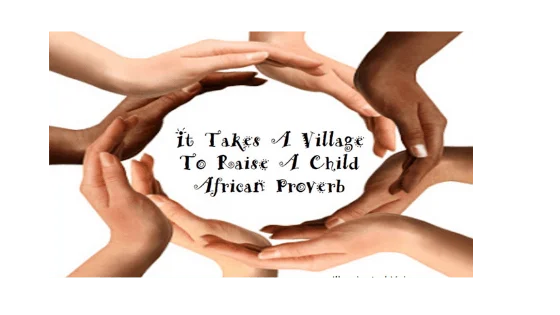
“It takes a village to raise a child” is an African proverb that highlights the inclusiveness of child-rearing in Africa. In other words, your child is only considered yours while in your tummy. Once a child is born, they don’t just belong to you; they belong to the whole community, who would now look after them as their own.
I remember vividly how warm and welcoming my aunties, uncles, cousins, friends, and even neighbors were when I went over to visit. This was the same for other kids who came to visit my household. My mother will make sure they have something to eat. The concept “it takes a village to raise a child” was more true then than it is today.
The African culture is diverse, with many different ethnic groups and traditions across the continent. Each community may have its own unique practices and beliefs when it comes to parenting. Parenting in African culture is often deeply rooted in traditions, values, and communal support.
Here are some key aspects of parenting in African culture:
Emphasis on the Collective: African culture places a strong emphasis on community and extended family networks. Parenting is seen as a collective responsibility, with family members, neighbors, and close friends all contributing to the upbringing and well-being of children. This sense of community support is often referred to as “it takes a village to raise a child.”
Respect for Elders: African cultures generally value and respect elders. Parents teach children to show respect towards older family members, and elders play an important role in passing down traditions, wisdom, and values to younger generations.
Oral Tradition and Storytelling: Storytelling plays a significant role in African culture, and parents often use it as a way to pass down moral values, cultural heritage, and life lessons to their children. Through folktales, proverbs, and other forms of oral tradition, important values and cultural knowledge are transmitted from one generation to the next.
Importance of Education: Education is highly valued in African culture, and parents strive to provide their children with opportunities for learning and personal growth. Education is seen as a pathway to success and a means to uplift oneself and the community.
Discipline and Respect: African culture places importance on discipline and respect within the family unit. Parents typically set clear boundaries and expectations for their children and use disciplinary measures to instill values and good behavior. Respect for authority figures, such as parents, elders, and teachers, is emphasized.
Gender Roles: Traditional gender roles may still influence parenting practices in African culture. While expectations may vary across different African countries and communities, there can be traditional views on the division of labor and responsibilities between men and women in raising children.
Life without my village
When I became pregnant with my first child, I was so excited but also terrified at the same time. I had no idea what to expect. Living in America without my mother, sister, aunties, and cousins, who ordinarily would’ve been in my village to help raise this child, left me terrified.
Parenting without a support system can feel overwhelming and lonely. However, it’s important to remember that support systems can be built, even if they are not readily available. Seeking out local parenting groups, joining online communities, reaching out to neighbors or colleagues, and participating in parenting classes or workshops can help in forming a support network. Additionally, professional resources such as therapists, counselors, or parent coaches can provide guidance and support during challenging times. Parenting without a support system can be challenging.
Having a support system is crucial for a variety of reasons:
Emotional Support: Parenting can be emotionally demanding, and having a support system provides a space to share frustrations, joys, and concerns with others who understand the journey. It helps reduce feelings of isolation and provides a sense of validation and empathy.
Practical Help: Parenting involves numerous responsibilities and tasks, including childcare, household chores, and managing daily routines. A support system can offer practical help in the form of shared responsibilities, babysitting, or assistance with errands and household duties.
Advice and Guidance: Raising children comes with its own set of challenges and uncertainties. Having a support system of experienced parents, family members, or friends can provide valuable advice, knowledge, and guidance when facing difficult decisions or situations.
Socialization for Children: A support system can also provide socialization opportunities for children. They get to interact with other children, develop important social skills, and forge friendships. In the absence of a support system, finding opportunities for children to socialize may require more effort and creativity.
Self-Care: Parenting can be physically and mentally exhausting, and having a support system allows parents to take breaks, prioritize self-care, and recharge. Without a support system, parents may find it harder to find time for themselves, leading to increased stress and burnout.
The reality of motherhood

Once my baby girl was here, I was overjoyed, but the hardship and struggles of motherhood soon kicked in, and I would sometimes just get so overwhelmed that I thought I was losing it. Not having my (village) to turn to made me so paranoid, as 70% of the time, I thought I was doing something wrong and was going to hurt my baby in the process. I came to find out that a lot of other moms shared my fears and worries.
Mothers face a wide range of challenges and struggles in their parenting journey, as every child and family is unique.
Here are some common things that many mothers say they struggle with:
Balancing Work and Parenting: Many mothers struggle to juggle the demands of their careers or work responsibilities while being present and available for their children. Finding the right balance between work and family life can be a source of stress and guilt for many working mothers.
Fatigue and Lack of Self-Care: Parenting takes a lot of physical and emotional energy, and many mothers find themselves exhausted and overwhelmed. It can be challenging to find time for self-care activities like exercise, relaxation, or pursuing personal interests, which can lead to feelings of burnout and resentment.
Managing Household Responsibilities: Mothers often find themselves bearing a significant portion of the household responsibilities, such as cooking, cleaning, and organizing the family’s schedule. This can lead to feelings of being overwhelmed and stretched thin.
Guilt and Self-Doubt: Mothers may experience guilt or self-doubt about their parenting choices, feeling like they are not doing enough or making the right decisions for their children. Comparisons to others and societal pressures can contribute to these feelings, causing added stress and anxiety.
Balancing Multiple Roles: Mothers often play multiple roles, such as being a partners, daughters, friends, and caregivers. Finding a balance and meeting the expectations of each role can be challenging and cause feelings of guilt if one area gets more attention than others.
Navigating Behavioral Challenges: Dealing with behavioral issues, tantrums, or conflicts with their children can be overwhelming for mothers. Finding effective discipline strategies and maintaining consistency can be a constant struggle.
Striving for Perfection: Many mothers feel pressure to be the “perfect” parent, which can be unrealistic and exhausting. Striving for perfection can contribute to feelings of inadequacy and increased stress. It’s important for mothers to remember that they are not alone in facing these challenges and that seeking support from family, friends, or professionals can be beneficial. Taking care of one’s own well-being is also crucial in order to be the best parent possible.
Saved by google
Thank God for Google, which became my saving grace. When I realized that Google could answer some of my questions, it was a big relief. Having a village help raise your child is still one of my favorite things about growing up in Africa.
However, most parents turn to a variety of online platforms for various purposes, such as those listed below:
Social Media: Platforms like Facebook, Instagram, and Twitter are widely used by mothers to connect with other parents, join parenting groups, share parenting experiences, and find support. These platforms provide a sense of community and can be helpful for seeking advice or recommendations.
Parenting Websites and Blogs: There are numerous websites and blogs dedicated to parenting, offering a wealth of information, tips, and resources. Mothers often visit these sites to gather knowledge on child development, parenting techniques, health, nutrition, and other relevant topics.
Online Forums and Discussion Boards: Online forums and discussion boards specifically geared towards parents and moms are popular places to seek advice, ask questions, and engage in discussions with other parents facing similar challenges. Websites like BabyCenter, What to Expect, and Netmums are examples of such platforms.
Parenting Apps: The rise of smartphone apps has made it easier for mothers to access parenting-related information and resources on the go. From pregnancy trackers and breastfeeding guides to baby sleep apps and parenting tools, there are numerous apps available to assist mothers in different aspects of parenting.
Online Retailers: Online marketplaces and retailers like Amazon, Walmart, and Target offer a wide range of products for mothers and children. Many mothers use these platforms for convenient shopping, reading reviews, and comparing prices.
YouTube and Video Content: Mothers frequently turn to YouTube for video content related to parenting tips, DIY projects, cooking recipes, educational videos for children, and more. YouTube offers a vast array of user-generated content that caters to various parenting interests and needs.
Online Courses and Webinars: With the increasing popularity of online learning, many mothers take advantage of online courses and webinars covering topics like childbirth, infant care, toddler behavior, and parenting strategies. Platforms like Udemy, Coursera, and Khan Academy offer a wide range of courses for parents.
Join the Village
I am hoping to build a virtual village here where we can all come to share ideas and show support to one another because we can not parent alone, so join the village.


